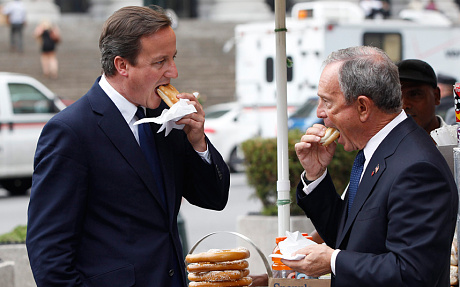Unknown knowns: Bloomberg’s Cameron vote had many dying metaphors

British Prime Minister David Cameron and then NYC mayor Michael Bloomberg eat a companionable hot dog outside Penn Station in New York
One day after the British election and I can’t help but recall Michael Bloomberg’s championship of David Cameron. It was a great example from across the pond of political language that relies on dead imagery to bring a concept alive.
Mr Bloomberg, of course, is the former mayor of New York City, the founder and majority owner of Bloomberg LP and is the UN secretary-general’s special envoy for cities and climate change. In other words, he is someone who might be expected to know how to use words simply, clearly and well.
But no, he too, uses dying metaphors, those clichéd constructions that George Orwell so disliked because they no longer mean anything in the modern world.
Consider this sentence in his essay outlining why David Cameron should win:
“He trimmed the budget’s sails with great skill, adapting to conditions as they changed and keeping the ship of state moving forward.”
What did Mr Bloomberg really mean?
That the British prime minister cut his spending plans without bringing government to a halt.
Why didn’t he say that instead of talking about “trimming sails” and “the ship of state”?
Perhaps because clichés are a good way to stop thinking – in the short term, anyway.
Mr Bloomberg doesn’t stop there. He goes on in a supposedly vigorous way, to explain his interest in Britain (he visits frequently as his company employs more than 3,000 people and is building its new European headquarters there). And he writes: “Britain’s progress has been hard won, thanks to hard choices, made in the face of tremendous resistance, that were proved right.”
That’s just so much tosh, so many words, deliberately put together in a way that’s imprecise and unclear enough to cloud thinking. As The Economist’s Lexington wrote a couple of years ago: “Politicians will never use language the way Orwell did, marrying clarity of thought with precision. A politician has to win elections, which means convincing lots of people with widely varying interests and opinions that he is on their side. Alas, that requires waffle, fudge and snappy slogans. These are hard to coin…”
More soon. Language continues to confound us.


